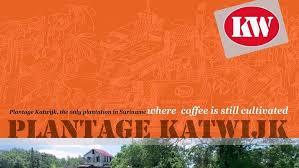SURNINAME
MET 12 TON GROENE KOFFIE EEN JAAR, NR. 71 KOFFIEPRODUCTIELANDEN.
- Tussen 1712 en 1718 brachten de Nederlanders de koffie naar Suriname.
- De landbouw bloeide in de eerste helft van de 18e eeuw.
- Koffie, maar ook cacao, tabak, suiker en indigo werden geteeld.
- Het meeste werk op de plantages werd gedaan door ongeveer 60.000 Afrikaanse slaven, voornamelijk uit Ghana, Benin, Angola en Togo.
- Met de afschaffing van de slavernij in 1863 en de vrijlating van de slaven in 1873 konden de plantages nauwelijks worden beheerd.
- In die tijd werden veel contractwerkers uit China, Java en India gebracht.
- In 1975 werd Suriname onafhankelijk.
- Van de eens 200 plantages tijdens het koloniale tijdperk overleefde er slechts één.
- De plantage Katwijk bevindt zich op de Commewijne. Het werd opgericht rond 1746 en behoort tegenwoordig tot de NouhChaia-familie, die niet alleen KW Arabica-koffie maar ook verschillende citrusvruchten cultiveert. Sinds 2012 kunt u rondleidingen op de plantage boeken om meer te leren over de geschiedenis en het agrarisch erfgoed.

SURNINAME
WITH 12 TONNES OF GREEN COFFEE A YEAR, NO. 71 OF COFFEE-PRODUCING COUNTRIES.
- Between 1712 and 1718 the Dutch brought the coffee to Suriname.
- Agriculture flourished in the first half of the 18th century.
- Coffees, but also cocoa, tobacco, sugar and indigo were grown.
- Most of the work on the plantations was done by about 60,000 African slaves, mainly from Ghana, Benin, Angola and Togo.
- With the abolition of slavery in 1863 and release of the slaves in 1873, the plantations could hardly be managed.
- At the time, many contract workers were brought from China, Java and India.
- In 1975, Suriname became independent.
- Of the once 200 plantations during the colonial era, only one survived.
- The Katwijk plantation is located on the Commewijne. It was founded around 1746 and today belongs to the NouhChaia family, who cultivate not only KW Arabica coffee but also various citrus fruits. Since 2012 you can book tours on the plantation to learn more about the history and the agricultural heritage.

You don't need to spend anything, but if you do, it will be for your own account.
Date: Friday, 17 January 2020
Time: From 06h45 - 07:45
Place: Brioche, 181 Main Rd, Walmer
We look forward to seeing you there!
Logging in Dutch would be great.